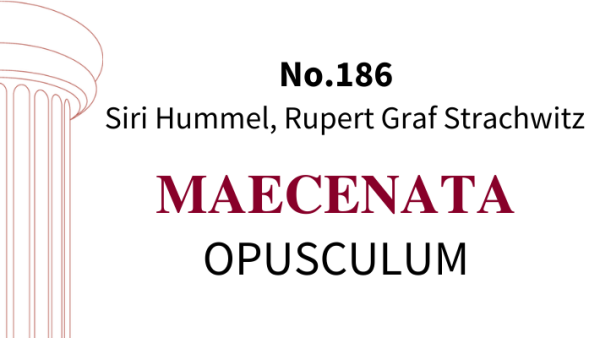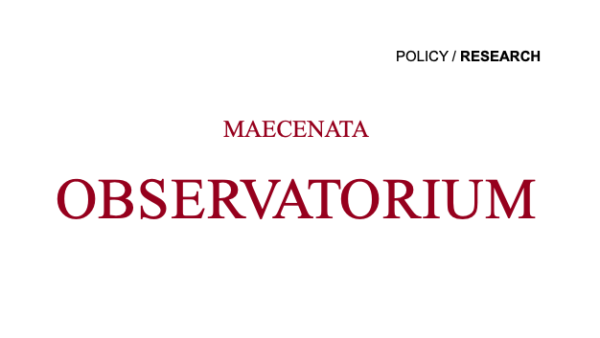Shrinking Civic Space-Project (ECSO)
With generous financial support from Porticus and the Open Society Initiative for Europe (OSIFE), the Maecenata Foundation has embarked on an ambitious project, based on the observation that the scope for civil society and the room for civic action and participation generally is changing and has deteriorated in many political constituencies. The European Civic Space Observatory (ECSO), which is implemented by the Maecenata Institute for Philanthropy and Civil Society (MI), should provide a theoretical and empirical contribution to the academic debate over this phenomenon, which henceforth will be referred to as ‘Shrinking Civic Space’ (SCS).
Given that the room in which civil society actors and individual citizens can contribute to public matters is subject to fundamental change in Europe, this will be the focus of the three-year research and awareness raising project on Europe. Whilst in some areas, the influence of civic initiatives is stronger today than ever before, civic action is highly controversial in others. One can generally assume that governments are attempting to oust non-state actors from public spaces and/ or to reduce them to support services. Infringements of basic human and civic rights are also becoming a common phenomenon.
ESCO is developing a monitoring system that is sensitive enough to map out the limits of civic space in European democracies and to deliver a theoretical approach, which sufficiently explains the paradox that “civic space is simultaneously growing and shrinking.” The Maecenata Institute has created a network of partners in selected European countries for this purpose. As it is a German institution, a special emphasis was placed on the analysis of Germany. Furthermore, the project is working on addressing and incorporating a series of academic endeavours and other studies, which can enrich the project’s overall goals. This has led to and will continue to lead to holding events and networking. Finally, preparing results and raising awareness of the questions linked to it is a central component of the project.
Hence, the first roundtable entitled ‘Facing shrinking space – How are you Civil Society?’ took place on 27 April 2022. The key questions for the English-speaking online event were: Where do we stand on the contestation of European’s Civil Society? What can CSOs do to respond? The participants were Sebastian Muckenhuber (Austria, WU), Ramon Feenstra (Spain, UJI), Anna Domaradzka (Poland, University of Warsaw), Claire Breschard (France, IFMA) alongside Valentin Toth (Civil Liberties Union for Europe) and Ruth de Frutos (UMA). A series of roundtables across Europe will follow. There, participants will present newly-published data from the ESCO project from Austria, France, Germany, Spain and Poland. Interactive workshops should help CSOs to build resilience as well as support affected CSOs in specific circumstances. The Roundtable was also approved to feature in the ISTR Conference in Montreal. There, Siri Hummel and Rupert Graf Strachwitz represented the project in July 2022.
The following country reports have so far come to fruition under the project framework:
- Hummel, Siri; Pfirter, Laura; Strachwitz, Rupert Graf (2022): On the State and General Condition of Civil Society in Germany
- Simsa, Ruth (2021): Rahmenbedingungen für die Zivilgesellschaft in Österreich (German)
- D’ambrosio, Rocco (2021): The Civic Space and Politics in an Epochal Crisis
Further project publications are expected in the course of the year.
Alongside the ESCO project, the Maecenata Institute has built the website shrinkingspace.eu, which offers help for civil society organisations and activists affected by the shrinking space phenomenon. The aim is to create a comprehensive data set of addresses for and of civil society organisations, which can be updated and shared. Moreover, this will allow those affected to document restrictions and cases of Shrinking Spaces on the website. We are thereby obtaining an effective tool for monitoring the conditions of action for civil society in Europe and a data basis for future studies.
Updates from the ECSO-Project

Civil Society is Here to Stay! A Report on the Shrinking Civic Space Project (2019-2023)
Opusculum 186 | 01.03.2024 | New report on the research and policy project conducted by the Maecenata Institute from 2019 to 2023
Observatorium 69 – Report on the ECSO-Symposium: The Civic Space in Europe – Shrinking, Growing, Enhancing?
Observatorium 69 I 22.08.2023 I Florian Faltenbacher, Flavia Gerner I Report on the ECSO-Symposium: The Civic Space in Europe – Shrinking, Growing, Enhancing?
Observatorium 68 – Civil society in Hungary at a turning point?
Observatorium 68 I 14.08.2023 I Melanie Hien I Civil society in Hungary at a turning point? Challenges for organizations >> PDF Download Civil society in […]





